- Home
- Harry Harrison
Winter in Eden Page 3
Winter in Eden Read online
Page 3
“Enge, follower-to-leader, what unhappiness moves your limbs so that I fear for my very life when you come close?”
Enge halted at this and conveyed apology. “Loyal Akel, what I was feeling was not for you—or for any of you others as well.” She looked around at the four remaining Daughters of Life and let her movements show how pleased she was with their companionship. “Once we were many. Now we are few so each of you is more precious than a multitude to me. Since we lived when all others died I feel that this has given us a mission—and a strength to carry out that mission. We will talk of that another time. There are other things that must be done first.” With her thumbs against her ribcage she signed listening-ears/watching-eyes. “The sorrow I brought with me is not my own. I will now give thought to the cause of that sorrow.”
She sought out a dark angle behind the bladders of preserved meat where she would be hard to see, then lay facing the living wall of the uruketo and forced her body into silent rigidity. Only when this exercise was complete did she let her thoughts return to Vaintè. Inner thoughts that were not echoed in her outer stillness.
Vaintè. She of immense hatreds. Now that Enge was free of any affection for her former efenselè she could see her for what she was. A dark power for evil. And once this fact was realized it became clear that her first act from this darkness would be directed against Enge and her companions. They had lived where all others had died. They would speak out in Ikhalmenets and what they would say would not be to Vaintè’s advantage. Therefore in her simple equation of cause and effect they would have to die; nothing could be plainer than that.
Dangers known could be avoided, threats seen counteracted. Plans must be made. The first one was the easiest. Survival. She stirred and rose and went to the others. Akel and Efen greeted her, but Omal and Satsat were asleep, already sinking into the comatose state that would see them through the long, dark voyage.
“Waken, please, we must talk,” Enge said, then waited until the others had stirred and were attentive again. “We cannot discuss, so I ask compliance/obedience. Will you do as I ask?”
“You speak for us all, Enge,” Omal said simply and the others signed agreement.
“Then this is what we will do. While four sleep one must always be awake—for there are great dangers. That is what must be done. If one is sleepy then another must be awoken. One will always sit awake beside the sleepers.” She looked about as they all communicated understanding and agreement. “Then all is well. Now sleep my sisters and I will remain awake at your side.”
Enge was sitting in the same position some time later when Vaintè climbed down from the fin, a shiver of hatred running the length of her body when she caught Enge’s watching eye. Enge did not respond—nor did she turn away. The placidity of her gaze irritated Vaintè even more so that she was forced to lie at a distance, her back turned, in order to calm herself.
It was a fast and uneventful crossing, for all aboard were so shocked by the death of Alpèasak that they escaped their remembered terrors in sleep, waking only to eat, then sleep again. But one of the appointed five was always awake, always watchful.
Enge was asleep when land was sighted, but she had left her orders.
“It is there, the greentree shore of Entoban*,” Satsat said, touching Enge lightly to awaken her.
Enge signed grateful thanks and waited in silent stolidity until the time came when the commander was alone on top of the fin: she joined her there and they both looked in silent appreciation at the line of white breakers that were drawn against the greens of the jungle beyond.
“Respectful request for knowledge,” Enge signed, and Erafnais let acceptance be known. “We are looking at the shore of warm and eternal Entoban*. But is it known at what position on the coast we see?”
“Somewhere here,” Erafnais said, holding out the chart tight-clamped between the thumbs of one hand, the thumbs of the other spanning a distance on the coast. Enge looked closely at it.
“We must proceed north along the shore,” Erafnais said, “then on past Yebèisk to the island city of seagirt Ikhalmenets.”
“Would impertinence be assumed if I asked the commander to point out warm-beached Yebèisk when we are close?”
“Communication will be made.”
Another two days passed before they came to the city. Vaintè was also interested in Yebèisk and stood at the far end of the fin while Erafnais and Enge remained at the other. It was late afternoon when they passed the high trees, the golden curve of the sands on each of the city’s flanks, the tiny forms of the fishing boats returning with the day’s catch. Surprisingly, after all her earlier curiosity, Enge showed scarcely any interest at all. After one long glance she signed her gratitude for information and went below. Vaintè permitted herself a spasmodic glare of hatred as she passed, then stared back at the shore.
In the morning she listened as a crewmember addressed the commander, and could not control the tremors of anger that shook her body. She should have known—should have known.
“They are gone, Erafnais, all five of them. I saw their sleeping positions vacated when I awoke. They are not here in the uruketo or in the fin.”
“Nothing was seen?”
“Nothing. It was my duty to awaken first this day to take the guiding position. It is a mystery . . .”
“No it is not!” Vaintè cried aloud and they drew back from her. “The only mystery is why I did not see what was going to happen. They know that no good will come to them in the bold city of Ikhalmenets. They seek hiding places in Yebèisk. Turn about, Erafnais, and go there at once.”
There was command in Vaintè’s voice, authority in the stance of her body. Yet Erafnais made no move to obey, instead stood in immobile silence. The watching, listening crewmembers were rigid, each with an eye turned toward one of the speakers. Vaintè signed urgency and obedience and wrath, hovering like a destructive thundercloud over the smaller commander.
Bentback, dragfoot Erafnais—with a will of her own. She had had more than a hint of the motives involved here. Enge had been kind to her and never offended her—while she knew little of the Daughters of Life, cared even less. What she did know was that there had been enough killing. And it was obvious that death lay behind every one of Vaintè’s venomous movements.
“We will proceed. We will not turn back. Dismissal of presence from commander to passenger.”
Then she turned about and walked away, letting her limp muffle the positions of pleasure and superiority in her body movements.
Vaintè was rigid with anger, paralyzed by impotence. She did not command here—did not command anywhere echoed back darkly from her thoughts—nor could she use violence. The crewmembers would not permit that. She was locked in a silent, internal battle with her anger. Logic must rule; cold thought must vanquish. The inescapable fact was that there was absolutely nothing that could be done at the present time. Enge and her followers had escaped from her for the moment. That was of no importance. In the fullness of time they would meet again and instant justice would follow. Nor could anything be done now about the commander of the uruketo. These things were all too petty to be considered. What she should be thinking about was the riverine city of Mesekei and the important tasks that must be undertaken there. If she were to achieve her ends careful planning would be needed, not mindless anger. For all of her life she had kept her anger carefully in check and she wondered now at the newfound strength of it. It was the ustuzou that had done that, destroyed her calm and turned her into a creature of intemperate justice. Kerrick and his ustuzou had made her like this. It would not be forgotten. In the future her anger would be kept under control at all times, for all things. Except one. Hatred treasured was hatred that grew strong in a hidden place. One day to be released.
With the working of these thoughts the tension eased and her body was hers again. She looked around and found that she was alone. Erafnais was in the fin above with the crewmembers who were on duty; the rest were comatose and asle
ep. Vaintè looked toward the place where Enge and her followers had slept and it was just an empty area that meant nothing to her. This was as it should be. She was back in control of her body and her emotions again. There was a movement in the darkness beyond and she could clearly hear the sounds of communication-desired. Only then did she remember the presence of the fat scientist and the male. She approached them.
“Aid a helpless male creature, great Vaintè,” the captive pleaded, squirming in Akotolp’s unyielding grasp.
“I know you from the hanalè,” Vaintè said, amused by the thing’s mewling. “You are Esetta< who sings—are you not?”
“Vaintè is first-always because she recalls the name of everything, smallest to highest. But now miserable Esetta< has nothing to sing of. The heavy one who now holds me, she pulled me from the hanalè, dragged me through smells and fog that hurt my breathing, half-drowned me on the way to this uruketo, now holds me in her unbreakable grip of great pain. Speak with her I entreat, suggest she release me before death of arm.”
“Why aren’t you dead completely?” Vaintè asked with brutal candor. Esetta< recoiled and squealed.
“Oh, great Vaintè—why do you wish this one of no importance dead?”
“I do not, but all the others died. Brave Yilanè of Alpèasak. Cast out by their dead city to die with it.”
Even as she spoke Vaintè felt the crushing wave of fear. They were dead—not she. Why? She had told loyal-dead Stallan that this was because of their hatred of the ustuzou. Was it? Was that reason enough to stay alive when all others died? She looked at Akotolp as these dark thoughts embraced her and realized for the first time what the scientist was experiencing. Doubt-in-life, avoidance-of-death. Akotolp had labored in many cities, so felt no life-destroying loyalty to any single one. But she was scientist enough to know that the death of rejection could be triggered in an instant. That was what her rigid, silent battle was about. By the force of her will she was keeping herself among the living.
This knowledge was a flow of strength to Vaintè. If this fat one could live by will alone then she, with an eistaa’s strength of will could live, survive—and rule once more. Nothing was beyond her!
Before the unseeing eyes of Akotolp, the fear-filled eyes of the male, Vaintè raised clenched thumbs in a forceful gesture of victory, trod strongly with outstretched claws upon the resilient surface. A moan of fear penetrated her consciousness and she looked down with growing pleasure at the cowering Esetta<: desire came instantly.
She bent and her strong thumbs pried loose the scientist’s grip on the male’s wrist. His repeated sounds of gratitude changed quickly to moans as she pressed him over backward, painfully excited him, mounted him brutally.
Akotolp’s tight-locked muscles never relaxed—but her nearest eye moved slowly to gaze at the entwined couple. Even more slowly her stiff features moved with unreadable expressions.
After this Vaintè welcomed deep sleep, slept comatose until the following morning. When she awoke the first thing that she saw was the fat scientist climbing breathlessly up into the fin. Vaintè looked around but did not see the male; hiding from her without doubt. She moved slightly with humor at the thought, then found herself awake, excited by thought of Esetta<. The uruketo rolled as it encountered a large wave and a shaft of bright sunlight from the fin illuminated the interior. The sun looked warm and attractive and Vaintè came fully awake, standing, yawning and stretching. The sunlight drew her on and she went to the fin, climbed slowly up to its top. Akotolp stood there, her eyes in the bright sunshine mere vertical slits in her round face. She glanced at Vaintè and acknowledged grateful presence.
“Come bask in the sun, kind Vaintè, to take pleasure while I thank you.”
Vaintè signed acceptance, pleasure—and question of source. Akotolp laced her fat thumbs together in relaxed companionship and spoke.
“I thank you, strong Vaintè, because your example was instrumental in saving my life. The logic of science rules my existence, but I know too well the part the body plays, irrespective of the brain’s control. I know that an eistaa’s command can trigger the metabolic changes in a Yilanè that will cause her certain death. Then I saw, when all died in tragic Alpèasak, that the death of a city could start this response as well. When I realized what was happening I feared for myself, despite my superior knowledge, feared that I too would be mortally stricken. The male’s survival helped. When he remained alive so might I. That is the reason that my hand stayed tight-clamped to him while I fought for survival. Then you came and took him from me and I was aware and vision returned. I saw you magnificently alive, so feminal that I took strength from you and knew that my death was averted. I thank you for my life, strong Vaintè. It is yours to dispose of: I am your fargi and will do as you command.”
At this moment another long wave rocked the uruketo and Akotolp’s ample form fell sideways. Vaintè reached out and took her arms, stopped her from falling, held her and expressed sincere thanks of equal to equal.
“Now it is I who thank you, great Akotolp. I have much to do and a long way to go. I will need aid. I welcome you as my first follower in that which I must accomplish.”
“I take pleasure in that Vaintè, and am yours to command.”
They swayed in unison now as the uruketo rose over a greater wave: a shadow blotted out the sun for an instant. They looked up and Akotolp signed joy-of-vision.
It was indeed a rich sight to behold. They were passing the mouth of a great river with limegreen jungle stretching away on both sides. Where river met ocean high waves were formed, rolled and foamed. And here the estekel* fished in numbers too large to count. They bobbed on the waves, great furred wings folded, long beaks plunging deep until just the bony rear extensions of their heads were above water. Others soared in slow circles above, their swift shadows sliding across the sea beneath them. Hoarse cries sounded from the creatures, louder and louder as the uruketo moved into their midst.
“See there, see how they launch themselves into the air,” Akotolp cried with pleasure. “I have studied these animals. If you examine them you will see that their wingspan is so great, their legs so short, that it is impossible for them to take flight other than from an estuary like this. Here high waves form and march into the wind rather than away from it. So the estekel*, after eating their fill, launch themselves from the crest of the wave into the wind—and are airborne. Wonderful!”
Vaintè did not share the scientist’s enthusiasm for the fish-stinking, fur-matted flying creatures. They dived too close and their shrieking hurt the ears. She left Akotolp there and climbed below and, despite the rocking, fell asleep again. She spent the rest of the voyage this way, comatose and unmoving, was still asleep when Erafnais sent a crewmember to inform her that they had reached their island destination and soon would be coming to Ikhalmenets.
Vaintè climbed the fin to see that the ocean behind them was empty. They had traveled most of the day away from the shores of Entoban* to reach this archipelago, isolated here in the vastness of the sea. They were now passing a large island with a ridge of high mountains in the center of it. The summits were topped by snow, wreathed with clouds and swept by sheets of rain, a grim reminder of the winter that was the enemy of them all. These rocky islands were too far to the north for Vaintè’s liking and she felt chill at the thought, looked forward to leaving just as soon as it was possible.
Or should she? They were coming to seagirt Ikhalmenets now, the city backed by green jungles, flanked by yellow sand beaches, a high, snow-topped mountain rising above. This was their destination. She looked at the snow-capped peak of the island, stared at it, unmoving, her body rigid, letting the new idea grow and mature. Perhaps coming to Ikhalmenets had been a good thing after all.
Es et naudiz igo kaloi, thuwot et freinazmal.
MARBAK ORIGINAL
If you hunt two rabbits, you miss both.
CHAPTER THREE
They ate at midday, after the Sasku had killed and butchered
one of the deer from the food pens. Kerrick found stones and made a fire-ring in the clear space before the hanalè, then brought dried driftwood from the shore. They could have made their camp anywhere in the ruined city—but he wanted to be close to the surviving Yilanè. While the Sasku hunters did not have the ready tempers and quick spears of the Tanu, they could still not be trusted alone with the two males. Death would come quickly if he were not vigilant.
By the time the hunters returned he had built the fire high so that a hot and glowing bed of coals was ready for the meat. In their hunger they could not wait until it had cooked through completely but hacked away half-raw pieces and chewed on them industriously. Kerrick had the liver, which was his right, but he shared it with Sanone.
“There are many new things to be seen in this place,” the old man said, carefully licking his greasy fingers clean before he wiped them on his cloth kirtle. “And many mysteries as well that will require much thought. Are there mastodon here among all the other creatures?”
“No, only murgu in this place, brought here from the other side of the ocean.”
“But we are eating this deer, certainly it is not murgu?”
“The deer, greatdeer as well, were all captured and bred here. But in the distant land where those-we-killed came from there are only murgu.”
Sanone chewed on this thought—along with another piece of liver. “I do not like to think of a land where only murgu walk. But this place across the ocean that you speak of is certainly part of the world that Kadair made when he stamped his feet and burst the rock asunder. From the rock he brought forth all we see and all we know, brought forth the deer and the mastodon—and the murgu. There is a reason for all this. There is a reason why we came to this place and another reason why this place is here. We must consider all these things until they can be understood.”

 Arm of the Law
Arm of the Law The Velvet Glove
The Velvet Glove The K-Factor
The K-Factor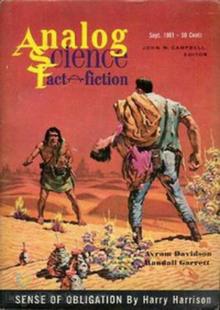 Sense of Obligation
Sense of Obligation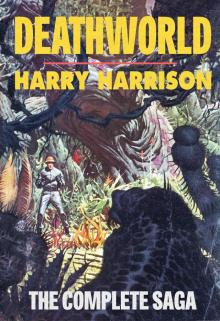 Deathworld: The Complete Saga
Deathworld: The Complete Saga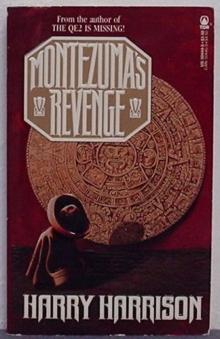 Montezuma's Revenge
Montezuma's Revenge The Ethical Engineer
The Ethical Engineer The Stainless Steel Rat Returns
The Stainless Steel Rat Returns The Misplaced Battleship
The Misplaced Battleship The Stainless Steel Rat is Born
The Stainless Steel Rat is Born Planet of the Damned bb-1
Planet of the Damned bb-1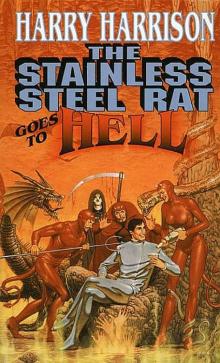 The Stainless Steel Rat Goes to Hell ssr-10
The Stainless Steel Rat Goes to Hell ssr-10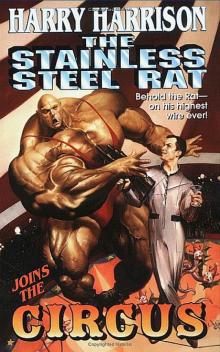 The Stainless Steel Rat Joins the Circus ssr-11
The Stainless Steel Rat Joins the Circus ssr-11 Galactic Dreams
Galactic Dreams The Harry Harrison Megapack
The Harry Harrison Megapack In Our Hands the Stars
In Our Hands the Stars On the Planet of Robot Slaves
On the Planet of Robot Slaves The Military Megapack
The Military Megapack Make Room! Make Room!
Make Room! Make Room! Wheelworld
Wheelworld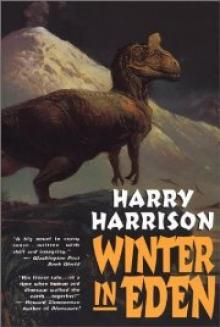 Winter in Eden e-2
Winter in Eden e-2 The Stainless Steel Rat
The Stainless Steel Rat The Stainless Steel Rat Goes to Hell
The Stainless Steel Rat Goes to Hell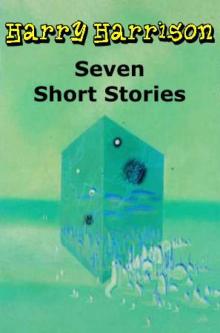 Harry Harrison Short Stoies
Harry Harrison Short Stoies Stainless Steel Rat 11: The Stainless Steel Rat Returns
Stainless Steel Rat 11: The Stainless Steel Rat Returns Stars and Stripes Triumphant sas-3
Stars and Stripes Triumphant sas-3 West of Eden
West of Eden The Stainless Steel Rat Go's To Hell
The Stainless Steel Rat Go's To Hell The Stainless Steel Rat eBook Collection
The Stainless Steel Rat eBook Collection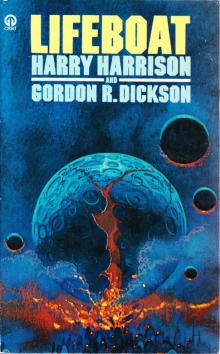 Lifeboat
Lifeboat The Stainless Steel Rat Sings the Blues
The Stainless Steel Rat Sings the Blues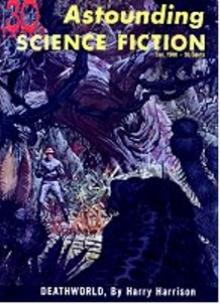 Deathworld tds-1
Deathworld tds-1 On the Planet of Zombie Vampires
On the Planet of Zombie Vampires The Daleth Effect
The Daleth Effect On The Planet Of The Hippies From Hell
On The Planet Of The Hippies From Hell The Turing Option
The Turing Option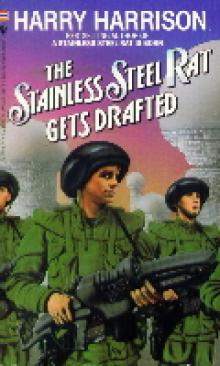 The Stainless Steel Rat Gets Drafted
The Stainless Steel Rat Gets Drafted Bill, the Galactic Hero btgh-1
Bill, the Galactic Hero btgh-1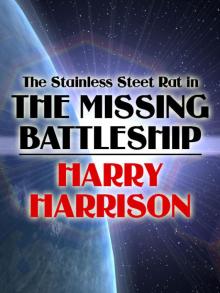 The Stainless Steel Rat in The Missing Battleship
The Stainless Steel Rat in The Missing Battleship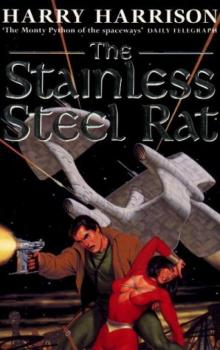 The Stainless Steel Rat ssr-1
The Stainless Steel Rat ssr-1 The Ethical Engineer (the deathworld series)
The Ethical Engineer (the deathworld series) The Stainless Steel Rat Saves the World ssr-3
The Stainless Steel Rat Saves the World ssr-3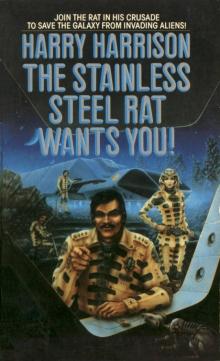 The Stainless Steel Rat Wants You
The Stainless Steel Rat Wants You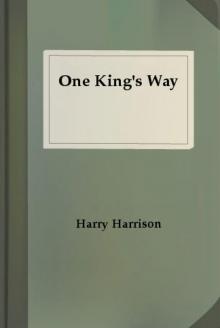 One King's Way thatc-2
One King's Way thatc-2 The Stainless Steel Rat Saves The World
The Stainless Steel Rat Saves The World Bill, the Galactic Hero
Bill, the Galactic Hero Stars & Stripes Forever
Stars & Stripes Forever Stars and Stripes In Peril sas-2
Stars and Stripes In Peril sas-2 A Stainless Steel Rat Is Born ssr-6
A Stainless Steel Rat Is Born ssr-6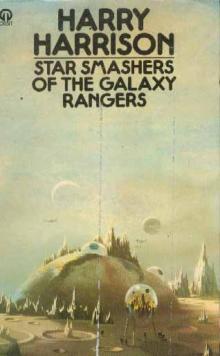 Star Smashers of the Galaxy Rangers
Star Smashers of the Galaxy Rangers Stars & Stripes Triumphant
Stars & Stripes Triumphant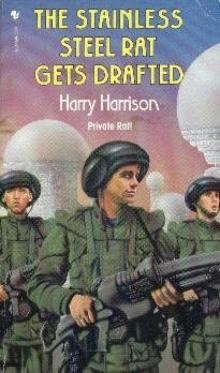 The Stainless Steel Rat Gets Drafted ssr-7
The Stainless Steel Rat Gets Drafted ssr-7 The Stainless Steel Rat for President ssr-5
The Stainless Steel Rat for President ssr-5 The Hammer & the Cross
The Hammer & the Cross The Technicolor Time Machine
The Technicolor Time Machine The Hammer and The Cross thatc-1
The Hammer and The Cross thatc-1 King and Emperor thatc-3
King and Emperor thatc-3 Return to Eden
Return to Eden The Stainless Steel Rat’s Revenge ssr-2
The Stainless Steel Rat’s Revenge ssr-2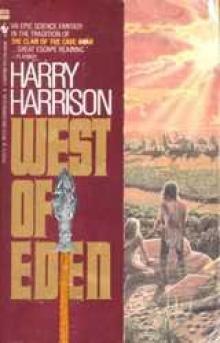 West of Eden e-1
West of Eden e-1 Return to Eden e-3
Return to Eden e-3 A Transatlantic Tunnel, Hurrah!
A Transatlantic Tunnel, Hurrah! Stars and Stripes Forever sas-1
Stars and Stripes Forever sas-1 The Stainless Steel Rat Wants You ssr-4
The Stainless Steel Rat Wants You ssr-4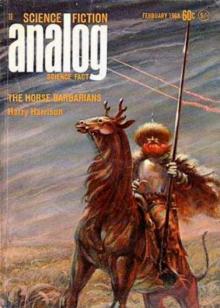 The Horse Barbarians tds-3
The Horse Barbarians tds-3 Planet of the Damned and Other Stories: A Science Fiction Anthology (Five Books in One Volume!)
Planet of the Damned and Other Stories: A Science Fiction Anthology (Five Books in One Volume!) On the Planet of Bottled Brains
On the Planet of Bottled Brains Stars And Stripes In Peril
Stars And Stripes In Peril The Stainless Steel Rat's Revenge
The Stainless Steel Rat's Revenge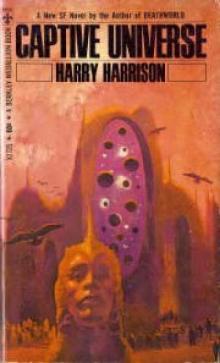 Captive Universe
Captive Universe The Stainless Steell Rat Sings the Blues ssr-8
The Stainless Steell Rat Sings the Blues ssr-8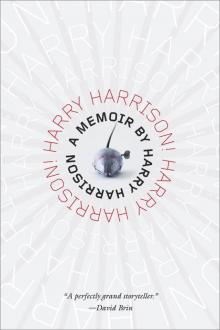 Harry Harrison! Harry Harrison!
Harry Harrison! Harry Harrison!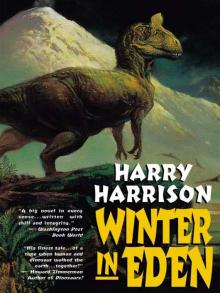 Winter in Eden
Winter in Eden On the Planet of Tasteless Pleasures
On the Planet of Tasteless Pleasures